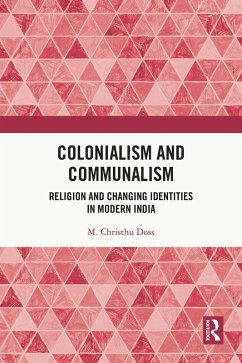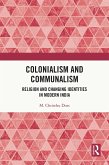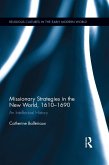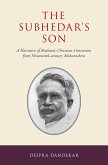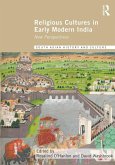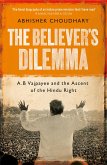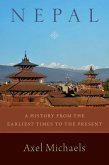Dieser Download kann aus rechtlichen Gründen nur mit Rechnungsadresse in A, B, BG, CY, CZ, D, DK, EW, E, FIN, F, GR, HR, H, IRL, I, LT, L, LR, M, NL, PL, P, R, S, SLO, SK ausgeliefert werden.
Bidyut Chakrabarty, Vice-Chancellor, Visva-Bharati (A Central University and an Institution of National Importance), Santiniketan, West Bengal, India.
"Dr. M. Christhu Doss's work, 'Colonialism and Communalism: Religion and Changing Identities in Modern India,' is an insightful and engaging account of communalism. In his book, Dr. Doss contextualizes communalism within the broader context of imperialistic domination and colonial conquest, portraying communalism as yet another tool for facilitating colonial conquest through cultural assimilation, primarily driven by the proselytizing endeavors of missionaries. Dr. Doss effectively documents that communalism was a calculated colonial endeavor for conquest, backed by multiple pieces of evidence. One key piece is the British State's paradoxical stance, promoting 'political neutrality' on one hand while covertly supporting and safeguarding the missionaries on the other. Communalization and colonization were mutually reinforcing projects that ultimately translated to emergence of alienation and dislocation at the community level. Ultimately, the "communalization of the secular mind" eroded 'Hindu' ethos of 'Sarva Dharma Sama Bhava' with longitudinal ramifications in the making of Modern India."
Harshita Kumari, Graduate Student, Institute of Development Studies (Gender and Development), University of Sussex, United Kingdom.
"Dr. M. Christhu Doss' book 'Colonialism and Communalism: Religion and Changing Identities in Modern India' presents a fascinating account of historiography in Modern Indian history. His fresh and insightful take on the "Colonial construct of Communalism" raises bold and relevant questions that are seldomly raised in academia. This book promises to bridge the gaps in history writing by investigating the cultural project of colonialism and its racial dimension that have been left unaddressed, if not entirely overlooked, by Postcolonial Studies. Particularly noteworthy is his emphasis that rewriting history must remain a purely academic exercise of incorporating new interpretations and viewpoints rather than being politically motivated. I am confident that this book will open new avenues of historical enquiry and will prove to be a helpful account for understanding the complexities and dynamics of modern Indian history."
Cherry Hitkari, PhD Scholar, University of Delhi, India.
"This book 'Colonialism and Communalism' authored by Dr. M. Christhu Doss, attempts to revisit the colonial injustices in the light of the revelations of the 21st century. The author demonstrates how colonialism was instrumental in creating communal ideologies in the Indian subcontinent. As an intersectional study this book unearths a number of stories that were either forgotten or overlooked in the historical writings. Revisiting the colonial construct of communalism, this book provides a new perspective that helps scholars of history, religion, and polity to challenge colonial theories that defined, and validated the notions of superiority and inferiority. A close reading of this book can help the reader to be critical of colonial forms of knowledge in general and modernity in particular."
Smridhi Chadha, M.Phil. candidate, Faculty of Asian and Middle Eastern Studies, University of Oxford, United Kingdom.
"One may disagree with what the author writes in this important book, but it is undoubtedly a sound historical re-assessment of the cultural soft war experienced by colonised Indians at the hands of state-supported missionaries. In the name of promoting enlightenment and Eurocentric modernity, mainly Hindus were confronted with vigorous critique of India's composite culture as a backward form of religion, while the new modernity was actually, inevitably, also of a religious nature. A major difficulty for such academic discourses remains the manifold scholarly use of the polysemic concept of 'secularism'. Doss defines this as respecting a plurality of religions, not as getting rid of religion. In colonial India, even largely now, based on simplistic assertions that classify modernity as secular and perceive tradition as 'religious', Hindus and Christians were drawn into communalist tensions, generating violence, rather than strengthening efforts for interfaith dialogue. Forms of soft power aggressively used by some current Hindu nationalist leaders today as a mouthpiece of postcolonial India may be viewed as tools for a defensive new strategy of anti-colonialism, manifesting as anti-globalism. While not discussing this, Doss indicates similar problems for balancing religion and changing identities in today's India, which may then generate communal violence."
Werner Menski, Emeritus Professor, SOAS, University of London, UK.
"Doss's work is an excellent deconstruction of communalism in colonial India that still festers. It maps the role of colonial state and proselytizers in the creation and perpetuation of it."
Himanshu P Roy, Professor, Centre for Political Studies, School of Social Sciences, Jawaharlal Nehru University (JNU), New Delhi, India.
"Dr. Doss's thought-provoking work offers a fresh take on interlinkages between communalism, colonialism, and post-coloniality compelling the reader to ask new questions. His work elucidates how Protestant proselytizing activities in India, fostered by British colonialists, had racial undertones that argued for the subjectivity and inferiority of Indians who needed to be salvaged by their religion. Dr Doss meticulously observes how the British conflated 'modernity' with Western values, science, and technology and a scathing attack on native cultural systems. The most compelling part of the study is questioning the nature of religious conversions during colonial period, which acted as a tool for solidifying British rule, the criticism and othering of non-believers, and finally escalating into turbulent forms of communalism."
Vidhi Gandhi, M.A. in History, Central European University, Vienna, Austria.
"One of the most exciting theorizations to emerge from the 1960s is Post colonialism, as a thought and as well as an approach. It has consistently questioned, the colonial constructs of knowledge systems and interpretations of the intellectuals on the argument that the lived in experiences of the colonized has been through the lens of the colonizer. A major area that has been convoluted and needs a rereading is what the identity of religion, secularism and practice of Faith meant for the community that was subjugated. It is here that Dr Doss's book becomes extremely relevant. His work unravels in a systematic manner the process through which agendas of the missionaries intertwined, with the political goals of Colonialism leading to, precipitating a category of communal rhetoric that must be contested. The writing style of Dr Doss is lucid and has used the arguments of a wide array of scholars, to substantiate his position. This introspective work is a most welcome addition to the Post Colonial readings and understanding of Communalism in India."
S. P. Vagishwari, Professor, and Head of the Department, Department of International Studies, Political Science and History, CHRIST University, Bengaluru, India.
"This work is a comprehensive treatment of the complicity of proselytizing agencies and its conversion efforts during the colonial period in the communalization of the Indian society. It offers a significant revision of the received view that communalism during the colonial period was the handiwork of the Indian nationalists. The insidious role of proselytizers during the colonial period is a hushed affair in the academic discourse on India-which is one of consequences of the colonization that India underwent-that this work, by digging into original sources, thoroughly exposes. This book will be read and discussed for many years to come."
Kundan Singh, Professor, Sofia University, California, USA.

